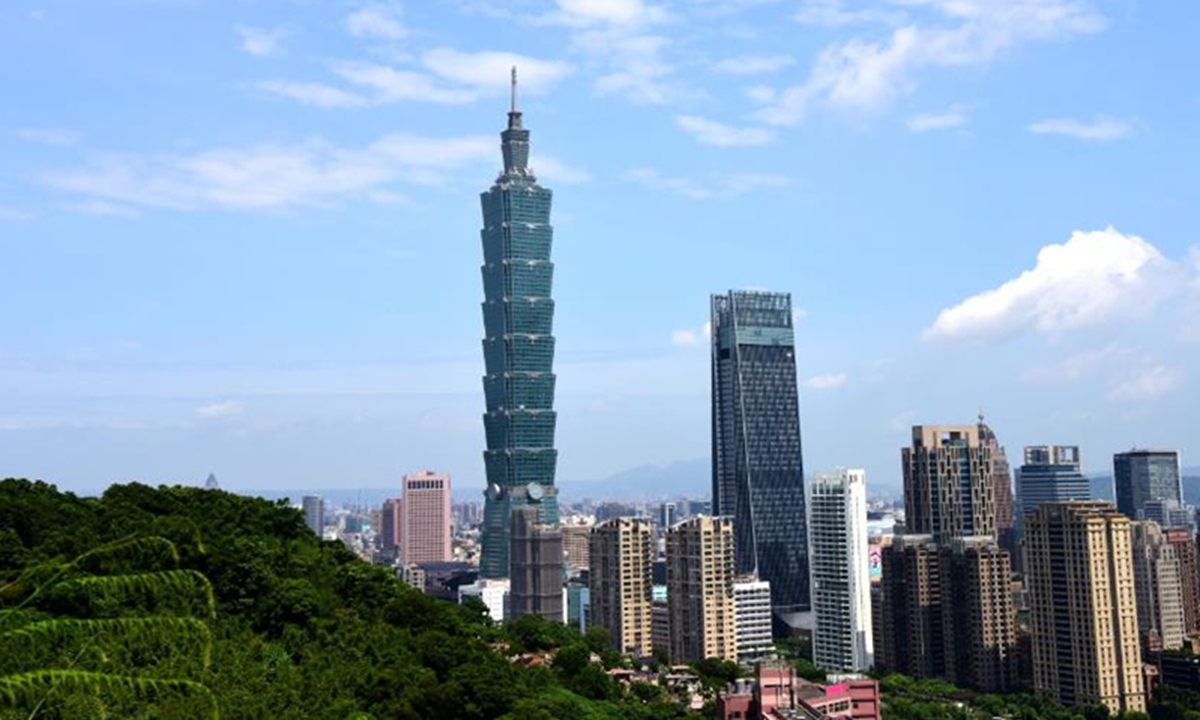Wording in joint statement the greatest degree of consensus Washington, Seoul can reach on Taiwan-related issues: observers

The Taipei 101 skyscraper in Taipei, southeast China's Taiwan. Photo: Xinhua
Chinese observers said the wording in the latest US-South Korea joint statement was the greatest degree of consensus the two can reach on Taiwan-related issues as facts once again demonstrated roping in South Korea to adopt a harder line against China was merely wishful thinking on the part of the US.
The joint statement, released after the meeting between US President Joe Biden and South Korean President Moon Jae-in on Friday, expressed the so-called concerns for the situations in the South China Sea and the Taiwan Straits, but did not directly mention China, going against earlier hype and speculation from media including the Voice of America and the Financial Times.
Chinese observers said Moon weighed in his balance and held onto South Korea's principles and stance in dealing with issues relating to China and the US by not crossing China's red line and obtaining what it wants at the same time, but observers also warned about the setback of failing to pull in South Korea to contain China will not be the end from the US.
"We pledge to maintain peace and stability, lawful unimpeded commerce, and respect for international law, including freedom of navigation and overflight in the South China Sea and beyond. President Biden and President Moon emphasize the importance of preserving peace and stability in the Taiwan Strait," the joint statement reads.
"Such remarks within the joint statement were anticipated and were the greatest degree of consensus that the US and South Korea can reach on the China issue," Lü Chao, a research fellow at the Liaoning Academy of Social Sciences, told the Global Times on Saturday.
During a press conference after their meeting, a reporter asked Moon if he was pushed by Biden to take a stronger stance when it comes to acting tougher toward the island of Taiwan. Biden immediately replied with "Good Luck" before Moon started his reply.
Instead of openly admitting there was a push from Biden, Moon replied in a more subtle way, "We've shared the view that peace and stability in the Taiwan Strait is extremely important, and we agreed to work together on that matter while considering special characteristics in relations between China and Taiwan," Moon said, according to Reuters.
The precondition of "considering special characteristics regarding relations between China and Taiwan" is important, as it indicates that Moon fully evaluated South Korea's position in the East Asian region. While South Korea underscored its alliance with the US, it won't follow in the steps of the US to take hostile measures against China, that remains its principle and stance in dealing with issues relating to China and the US, according to Lü.
"South Korea is a relatively weak link in the US' attempt to build a so-called anti-China alliance in East Asia," Zhou Yongsheng, a professor at China Foreign Affairs University, told the Global Times on Saturday.
"Different from Japan, which has abandoned its relative neutrality between China and the US, South Korea may not have the will to join the Quadrilateral Security Dialogue to counter China. China still remains South Korea's No.1 trade partner and plays a key role in the Korean Peninsula issue." Zhou said.
Prior to the meeting between Biden and Moon, the VOA claimed the scheduled South Korea-US joint statement will stress "China's move on the island of Taiwan" and will not be softer than the US-Japan statement citing an official source. The Financial Times also reported the Biden administration is pushing Moon to take a tougher line on China.
In sharp contrast, Japan is sliding onto the pathway of colluding with the US against China.
Japan was slammed by China as acting as a strategic vassal of the US and its collusion with the US is like inviting the wolf into the house after the joint statement in April between US President Joe Biden and Japanese Prime Minister Yoshihide Suga, which highlighted the US-Japan alliance for "peace and security" in the Indo-Pacific region and mentioned Taiwan for the first time in a US-Japan leaders' statement since 1969.
Although the US' expectation to rope in or force South Korea to take a harder line against China was not fulfilled, it promised to work together with South Korea to build stable supply chains for semiconductors, electric-vehicle batteries and promised to scale up vaccine supplies and vaccinate 550,000 South Korean service members against COVID-19.
Chinese observers regarded this slew of measures being US tactics to oblige South Korea to join its China containment policies. This setback has not made American peddling of Indo-Pacific strategic policy to South Korea the end story, they said.
The US will continue to seek other approaches including the Korean Peninsula issue to contain China and the pro-US forces in South Korea won't easily let moderates get away with it, Lü said.
Considering the strengthening alliance between the US and South Korea, Li Kaisheng, a research fellow and deputy director at the Institute of International Relations of the Shanghai Academy of Social Sciences, told the Global Times that in the future, China still needs to remain vigilant if the US makes more moves to rope in South Korea, like the way it did to Japan.
The US under the Biden administration has been busy forging a united front in the Indo-Pacific to curb China's growing influence.

